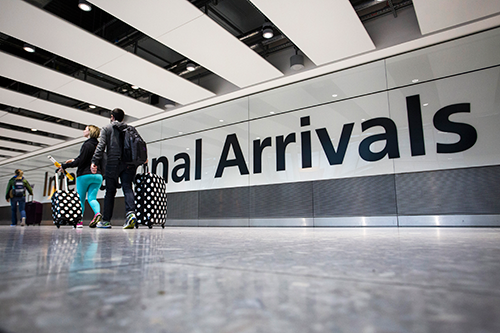During the COVID-19 pandemic, European Union member states have taken various travel restriction measures in order to limit the spread of the coronavirus. To ensure coordination and clear communication across the EU, the Commission has worked to enhance cooperation and information-sharing regarding these restrictions.
On 13 October 2020, on the basis of the Commission’s proposal, the Council adopted a recommendation on a coordinated approach to restricting freedom of movement in response to the COVID-19 pandemic. The recommendation aims to avoid fragmentation and disruption, and increase transparency and predictability for citizens and businesses. More specifically, it has developed a common approach on the following key points:
Apply common criteria and thresholds when deciding whether to impose travel restrictions
Mapping risk areas of COVID-19 transmission based on common conditions and agreed color code, published by the European Center for Disease Prevention and Control
A common framework for measures applied to travelers arriving from high-risk areas
Coordinate between member states and provide clear and timely information to the public about any restrictions
The Council’s recommendation was updated several times in response to developments in the pandemic. This included setting standard validity periods for Covid-19 tests.
Another important tool to facilitate safe travel within the EU is the EU Covid Digital Certificate Regulation, which came into force on 1 July 2021. The certificate served as proof that a person had been vaccinated against Covid-19, and had recently received a negative test result. Or recovered from COVID-19. When travelling, each certificate holder has the same rights as citizens of the Member State visited who have been vaccinated, tested or recovered from coronavirus (COVID-19). As such, the regulation aims to facilitate the gradual lifting of travel restrictions imposed by Member States.
The EU Covid Digital Certificate, used by most member states from its launch in 2021 until mid-2022, was a major success in Europe’s efforts to address and mitigate the impact of the Covid-19 pandemic on societies and economies. With more than 2.3 billion certificates issued, it was essential to support freedom of movement and Europe’s hard-hit tourism industry. As the epidemiological situation improves, the requirements for EU COVID digital certificates for travel within the EU have decreased. On 29 June 2022, to ensure the continuation of travel in the event of a significant deterioration in the epidemiological situation, the EU Covid Digital Certificate Regulation was extended until 30 June 2023. By August 2022, all Member States had lifted all travel restrictions within the EU.
On May 5, 2023, the World Health Organization He declared the end of the Covid-19 pandemic As a public health emergency of international concern. Reflecting this situation, the Commission has not proposed a further extension of the EU Covid Digital Certificate Regulation beyond 30 June 2023. Since 1 July 2023, the Regulation and its accompanying Council recommendations are no longer in force.
The positive impact of the EU Covid Digital Certificate system has extended beyond the EU, as it has become a global standard that draws strongly on the EU values of openness, security and data protection. Overall, 78 countries across five continents have benefited from the system. This success contributed to the resumption of safe international travel and global recovery. The World Health Organization has decided to adopt the European Union’s digital COVID-19 certification system to create a global system that will help protect citizens around the world from ongoing and future health threats, including pandemics.
For more information on possible future use of the underlying technology, see the EU COVID Digital Certificate.





